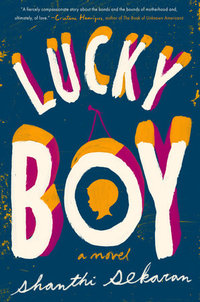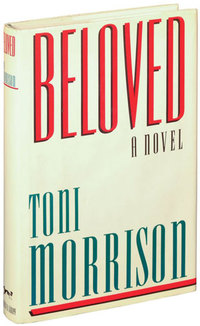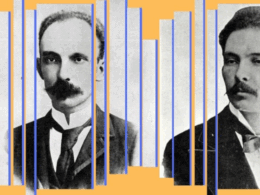
Library of America’s series of guest posts by contemporary writers returns with a piece by novelist Shanthi Sekaran, whose second novel, Lucky Boy, has just been published by G. P. Putnam’s Sons.
Lucky Boy centers on two California women—Soli, an undocumented Mexican immigrant, and Kavya, a successful Indian American chef who becomes foster mother to Soli’s young son after Soli winds up in an immigrant detention center. The Chicago Tribune called Lucky Boy “a gripping story,” and said that “Sekaran’s book invites the reader to engage empathetically with thorny geopolitical issues that feel organic and fully inhabited by her finely rendered characters.”
Below, Sekaran discusses her debt to the novel widely considered Toni Morrison’s masterpiece.
Late in the spring of 2014, I found myself with a novel manuscript that nobody wanted. It told the story of a young undocumented mother in Berkeley, California. At the end of several rewrites and two rounds of solid rejection, I was wrung dry. It took a few months of inaction, but eventually, I decided to give the book one more try. Exhausted by my own fruitless impulses, I turned to a masterpiece, the sort of book that dissolves its author, that seems to have sprung spontaneously into existence: Beloved by Toni Morrison.

I spent the following month studying this book, one I’d read several times before, but never so closely. I chose it because Morrison does something important and elegant with time and memory. While my own novel moved linearly through time, Morrison’s jumps continuously between backstory—her protagonist Sethe’s journey from Southern slavery to freedom in the North—and the present, when Sethe reckons with the ghost of the child she murdered.
I chose a small notebook and, like an apprentice painter copying a master, I transcribed verbatim Morrison’s moments of transition, each dainty step from past to present, which seemed to happen so magically in this book. Writing down her actual words, I brought them down to earth and convinced myself that I, too, could slip as seamlessly through time.
In the example that follows, Sethe’s fellow slave, Paul D, arrives at her home. She hasn’t seen him in years. Morrison leads her reader’s eye to Sethe’s face, specifically to her eyes, “two wells into which he had trouble gazing,” and we find ourselves transported from her free life in Cincinnati to her slave days at Sweet Home:
He looked at her then, closely. . . . Halle’s girl—the one with iron eyes and backbone to match. He had never seen her hair in Kentucky. And though her face was eighteen years older than when last he saw her, it was softer now. Because of the hair. A face too still for comfort; irises the same color as her skin, which, in that still face, used to make him think of a mask with mercifully punched out eyes. Halle’s woman. Pregnant every year including the year she sat by the fire telling him she was going to run. Her three children she had already packed into a wagonload of others in a caravan of Negroes crossing the river. They were to be left with Halle’s mother near Cincinnati. Even in that tiny shack, leaning so close to the fire you could smell the heat in her dress, her eyes did not pick up a flicker of light. They were like two wells into which he had trouble gazing. Even punched out they needed to be covered, lidded, marked with some sign to warn folks of what that emptiness held. So he looked instead at the fire while she told him, because her husband was not there for the telling. Mr. Garner was dead and his wife had a lump in her neck the size of a sweet potato and unable to speak to anyone. She leaned as close to the fire as her pregnant belly allowed and told him, Paul D, the last of the Sweet Home men.
There had been six of them who belonged to the farm, Sethe the only female. Mrs. Garner, crying like a baby, had sold his brother to pay off the debts that surfaced the minute she was widowed. Then schoolteacher arrived to put things in order. But what he did broke three more Sweet Home men and punched the glittering iron out of Sethe’s eyes, leaving two open wells that did not reflect firelight.
I remember reading this, losing myself in her past as surely as Sethe and Paul D did. And isn’t this how memory works? Aren’t we constantly losing hold of ourselves, sometimes for split seconds and sometimes for much longer? Some of us slip into the past for good. Some of us have forsaken the present.
With Morrison’s structural technique in mind, I refashioned the chronology of my novel, Lucky Boy. Like Sethe, my heroine Soli had undergone a journey—not from slavery, but over the California border, braving smugglers and drug gangs and the dangers of freight trains. She, too, makes her journey pregnant. She, too, starts a new life in a new place, but finds herself haunted by the past. After a summer and autumn of rewriting Lucky Boy, I had a book that resembled its earlier draft in content and spirit, but with a whole new interplay of past and present. It finally read the way it was supposed to.
I suspect that Toni Morrison doesn’t see her work as magic. I suspect she sees it as the end result of years of work, nights awake, stretches of exhilaration and self-doubt. When I came to Beloved, I took two, maybe three reads to fully understand the book and appreciate its flow. Now, the more I read it, the more spontaneous it feels. Even if Beloved’s creation called for arduous creative labor, its reader will find a received magic. Its labor created something sublime.
I’m lucky I found this book, lucky I read it several times before facing the mountain of my own creative roadblock. Every book, ingenious or ordinary, is a writer’s gift to the world. Sethe, from her perch by a fireside, spoke to Soli, a scared teenage migrant. This book, though she’ll probably never know it, was Toni Morrison’s gift to me.
California native Shanthi Sekaran teaches creative writing at California College of the Arts and is a member of the the San Francisco Writers’ Grotto. The Seattle Times praises Lucky Boy as “both a contemporary page-turner . . . and a model of delicate, artful writing that lets us see an entire world.” Sekaran’s writing has appeared in the Best New American Voices series, the New York Times, and Canteen, as well as online at LitHub and Zyzzyva.



